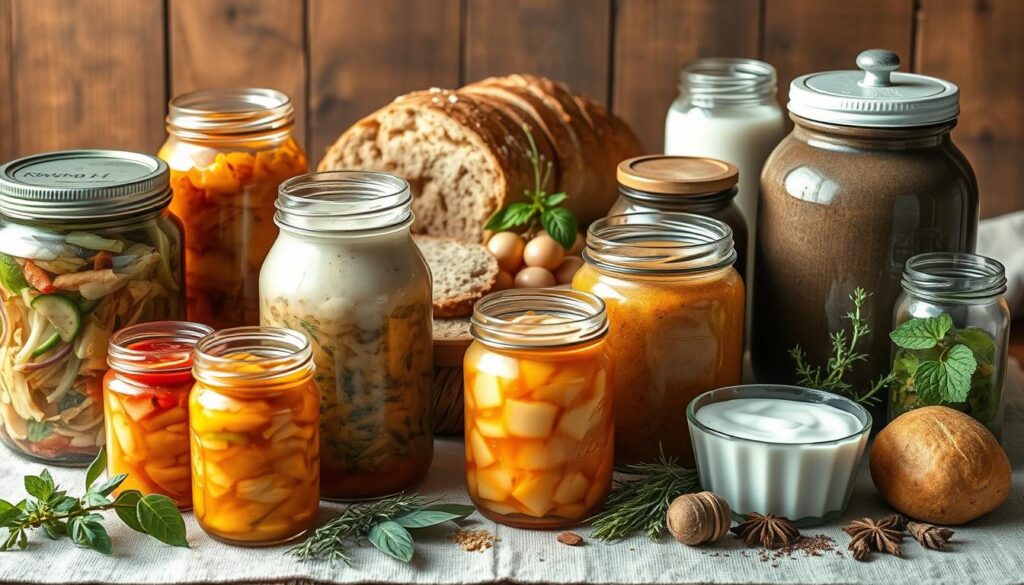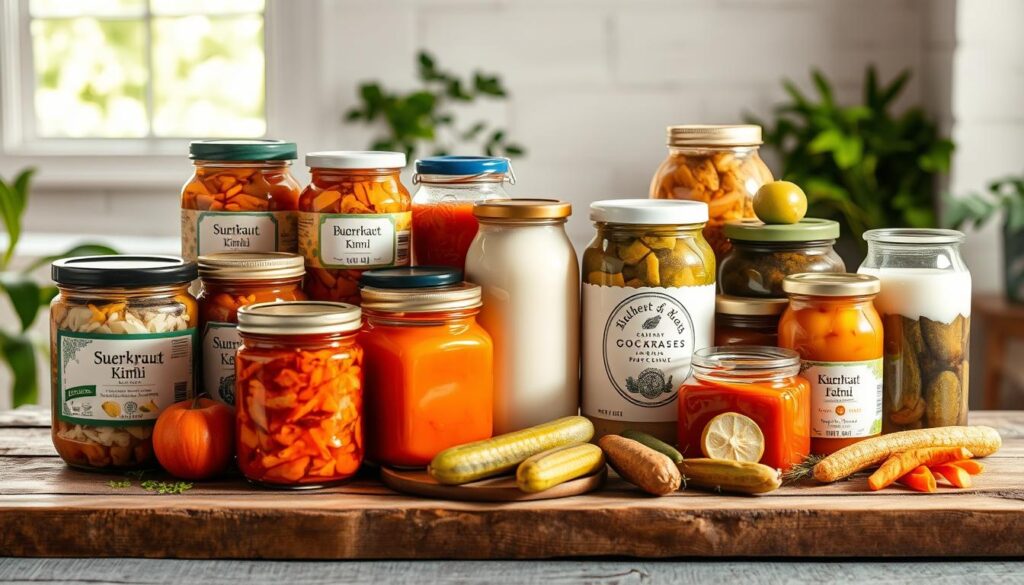Fermented foods have been around for centuries. Now, science supports their health benefits. They help keep our gut microbiome healthy, which is key for our well-being.

Our gut health is linked to our overall health. A healthy gut microbiome aids digestion, boosts immunity, and even affects our mood. Foods like yogurt and kefir are full of probiotics. They help our gut stay healthy, boosting our immune system and overall health.
Adding fermented foods to your diet is a great first step. It can improve your gut health and overall well-being. This is because of the gut microbiome and the benefits of probiotics.
Key Takeaways Fermented Foods
- Fermented foods are rich in probiotics, which support a healthy gut microbiome
- A healthy gut microbiome is essential for a strong immune system and overall wellbeing
- it have been a staple in many cultures for centuries, with proven health benefits
- Probiotics promote a healthy balance of bacteria in the gut, leading to improved digestion and immune function
- Incorporating it into your diet can improve your overall health and wellbeing, by supporting the gut microbiome
Understanding Fermented Foods and Their Role in Gut Health
Fermented foods have been part of our diets for centuries. Different cultures have their own ways of fermenting food. The fermentation process uses microorganisms like bacteria or yeast to break down sugars and make lactic acid. This makes the food more nutritious and adds health benefits.
The science behind fermentation is interesting. It creates complex flavors and textures. For example, sauerkraut is tangy, and kimchi is spicy. Knowing how fermentation works helps us see the value of these foods for our gut health and overall well-being.
Fermented foods can improve digestion, boost our immune systems, and give us more energy. These benefits come from the fermentation process, which fills the food with good microorganisms. Adding it to our diets can make us healthier and more balanced.
The Connection Between Gut Microbiome and Overall Health
The gut microbiome is key to our health, offering many health benefits beyond digestion. A healthy gut microbiome is vital for a strong immune system. Research shows that an imbalance, or dysbiosis, can cause health problems.
Here are some areas where the gut microbiome makes a big difference:
- Immune system function
- Mental health and mood regulation
- Weight management and metabolism
Understanding the gut microbiome’s role and promoting a healthy balance can greatly benefit our health. A balanced diet rich in it supports beneficial bacteria. This is crucial for a strong immune system.
In summary, the link between the gut microbiome and health is complex. By focusing on gut health and supporting beneficial bacteria, we can see many health benefits. This improves our overall quality of life.
Popular Types of Fermented Foods for Gut Health
Fermented foods come in many flavors and textures. They can make your meals more interesting. Eating different types of it helps keep your gut healthy. They are also packed with nutrients, making them great for a balanced diet.
Some popular types of it include:
- Yogurt and kefir: high in probiotics and protein
- Kimchi and sauerkraut: rich in vitamins and minerals
- Kombucha and fermented beverages: offer a fizzy and flavorful way to support gut health
- Miso and tempeh: provide a boost of umami flavor and nutrition
Adding these it to your meals can improve your gut health and nutrition. Whether you like the tangy taste of kimchi or the creamy yogurt, there’s something for everyone.
Benefits of Including Fermented Foods in Your Diet
Adding it to your meals can greatly improve your health. These foods offer many health benefits, like better digestion and a stronger immune system. They are packed with probiotics, which are good for your gut.
Some of the main benefits of eating it include:
- Improved digestion and reduced symptoms of irritable bowel syndrome
- Boosted immune system and increased production of antibodies
- Support for mental health and reduced symptoms of anxiety and depression
- Increased availability of essential nutrients and improved absorption
Eating it can lead to a healthier gut and better overall health. With their many health benefits and probiotics, it’s easy to see why they’re gaining popularity. They can help with digestion, boost your immune system, and even support your mental health.
How to Start Incorporating Fermented Foods Into Your Daily Meals
Adding it to your meals can boost your nutrition and gut health. The fermentation process makes these foods rich in good bacteria. This helps with digestion and strengthens your immune system.
Start with small amounts of it to ease into them. This helps your gut adjust and avoids any bad reactions.
Beginner-Friendly Options
Yogurt, kefir, and sauerkraut are great for beginners. They’re easy to find and can be added to your meals.
Creating Balanced Meal Plans
When planning meals with it, think about the diet’s nutritional balance. A diet full of whole foods and it is key for health.
Here are some tips for balanced meal plans:
- Eat a variety of whole foods like fruits, veggies, grains, and lean proteins.
- Add it like yogurt or sauerkraut to your meals.
- Get personalized advice from a healthcare pro or dietitian.
Making Your Own Fermented Foods at Home
Making your own it at home is fun and rewarding. The fermentation process lets you make tasty and healthy foods like sauerkraut and kimchi. These foods are full of probiotics. You’ll need basic stuff like a big jar, a weight, and a lid to start.
Here are some steps to follow:
- Choose your ingredients: Pick the veggies, fruits, or other foods you want to ferment.
- Prepare your ingredients: Chop, slice, or shred them as needed.
- Create a brine: Mix water, salt, and seasonings to make a brine solution.
- Assemble your ferment: Put your ingredients in the jar, add the brine, and weigh it down.
- Wait for fermentation: Let it sit at room temperature, letting the fermentation process happen.
By making your own it, you control the ingredients and the fermentation process. This way, you ensure your foods are full of probiotics and other good stuff. With patience and practice, you can make many delicious and healthy it.

Potential Side Effects and Considerations
Adding it to your diet can be great, but it’s important to know the possible side effects. These foods are full of health benefits, but they might not be right for everyone. Especially those with certain health issues or allergies. A healthy gut is key, and it can help keep it balanced.
Some people might get digestive issues or allergic reactions from it. It’s important to be careful and talk to a doctor if you’re worried. People with weak immune systems should be extra cautious when trying it.
- Start with small amounts and gradually increase your intake
- Choose fermented foods that are rich in health benefits and suitable for your dietary needs
- Be aware of any food allergies or sensitivities
By being careful and taking the right steps, you can enjoy the good things about fermented foods. And you’ll help keep your gut healthy too.
Combining Fermented Foods with Prebiotics
Fermented foods are a good start for gut health. But, adding prebiotics can make them even better. Prebiotics are fibers that feed probiotics, helping them grow in the gut. This mix of fermented foods and prebiotics boosts good gut bacteria and supports a healthy gut.
This combo works because prebiotics feed the probiotics in fermented foods. Some top prebiotic foods include:
- Asparagus
- Onions
- Garlic
- Whole wheat bread
- Bananas
Remember, everyone’s gut is different. So, how well this mix works can vary. Still, studies show it can help your gut health and overall health. By choosing the right foods, you can support your gut and balance your gut microbiome with prebiotics and probiotics.
Shopping and Storage Tips for Fermented Foods
When shopping for fermented foods, choose items that are full of nutrition. Look for labels that say “contains live cultures” or “raw.” This ensures you get the most health benefits. Yogurt, kefir, kimchi, and sauerkraut are great choices.
To store fermented foods right, follow these tips:
- Keep them in the fridge at a temperature below 40°F (4°C) to slow down the fermentation process.
- Use airtight containers to prevent contamination and spoilage.
- Consume them within a few days of opening to ensure maximum nutritional value.
By following these tips, you can enjoy fermented foods for longer. Always check expiration dates and look for products certified by reputable organizations. This way, you get high-quality fermented foods.

Common Myths About Fermented Foods Debunked
Fermented foods have been part of our diets for centuries. They offer many health benefits thanks to their fermentation process. But, some myths about them can be confusing. It’s important to know the truth to make smart choices about eating them.
Some think fermented foods are only for certain cultures or diets. But, this is not true. They can be good for anyone, helping with digestion and boosting the immune system. The fermentation process makes these foods special, growing good bacteria that helps us absorb nutrients better.
Separating Fact from Fiction
To clear up myths, we need to look at scientific studies. Many studies show fermented foods can be good for us. They can help reduce inflammation and even improve our mood. By adding fermented foods to our meals, we can see these benefits for ourselves.
Scientific Evidence and Research
Research proves that the fermentation process makes fermented foods unique. This process creates special compounds that offer health benefits. These benefits include lowering disease risks and improving nutrition. Knowing the science behind these foods helps us choose how to include them in our diets.
The Future of Fermented Foods in Modern Nutrition
Fermented foods are gaining popularity in modern nutrition for their health benefits. As research finds more advantages, we’ll see new products. Nutrition experts believe fermented foods will shape the food industry’s future.
New trends include fermented drinks and snacks. Fermentation will also become more common in food making. This will give consumers more choices and highlight fermented foods’ health benefits.
Technology will improve fermented food production. This will make these foods better and more available. As demand grows, more places will add fermented foods to their menus.
The future of fermented foods looks bright. With growth and innovation, we can enjoy their benefits in new ways. This supports good nutrition and health.
Conclusion: Embracing Fermented Foods for Better Gut Health
Incorporating probiotics from fermented foods into your diet can change your gut microbiome and health. These foods are full of nutrients and can help balance your digestive system. They offer many health benefits for a healthy gut.
If you’re new to fermented foods or want to try more, start small. Find what you like and fits your diet. You’ll find the foods that make you feel your best.
So, what are you waiting for? Start making your gut microbiome healthier by adding more probiotics to your life. Your body will be grateful.
FAQ
What are fermented foods and how do they benefit gut health?
Fermented foods are made when good bacteria or yeasts turn food’s sugars into lactic acid. They are full of probiotics. These help keep your gut healthy and improve digestion.
What are some examples of popular fermented foods?
You might know yogurt, kefir, kimchi, sauerkraut, miso, tempeh, and kombucha. They come from many cuisines and taste great.
How can the gut microbiome affect overall health?
The gut microbiome is full of trillions of microorganisms. They help with digestion, immune function, and even mental health. An imbalance can cause health problems, so keeping your gut healthy is key.
What are the benefits of including fermented foods in my diet?
Eating fermented foods can boost digestion, immune function, and weight management. They also support mental health. The probiotics in these foods help balance your gut microbiome, leading to better health.
How do I start incorporating fermented foods into my daily meals?
Start with small amounts of fermented foods and add more over time. Try yogurt or kefir first, then try kimchi, sauerkraut, or kombucha. Make sure to eat a variety and watch your portion sizes.
Can anyone benefit from including fermented foods in their diet?
Most people can benefit from fermented foods, but some should be careful. People with certain health issues or allergies should talk to a doctor first. Listen to your body and watch for any side effects.
What is the relationship between fermented foods and prebiotics?
Prebiotics feed the good bacteria in your gut, including those from fermented foods. Eating fermented foods with prebiotics can boost your gut health even more.
How should I store and shop for fermented foods?
Choose high-quality it that are refrigerated and have few ingredients. Store them well in the fridge and check expiration dates. This keeps them nutritious and effective.
Are there any common myths about fermented foods that I should be aware of?
Yes, there are myths about it. It’s important to know the facts from fiction. Rely on scientific research to understand their benefits and risks.
Source link
- https://www.eatingwell.com/habit-to-start-for-better-gut-health-11681954
- https://www.thesun.co.uk/wellness/34392742/worlds-healthiest-drink-kefir-health-benefits-skin-alzheimers/
- https://www.ucdavis.edu/food/news/gut-health-benefits-sauerkraut
- https://www.webmd.com/diet/ss/slideshow-benefits-fermented-foods
- https://www.ars.usda.gov/oc/utm/the-health-benefits-of-fermented-vegetables/
